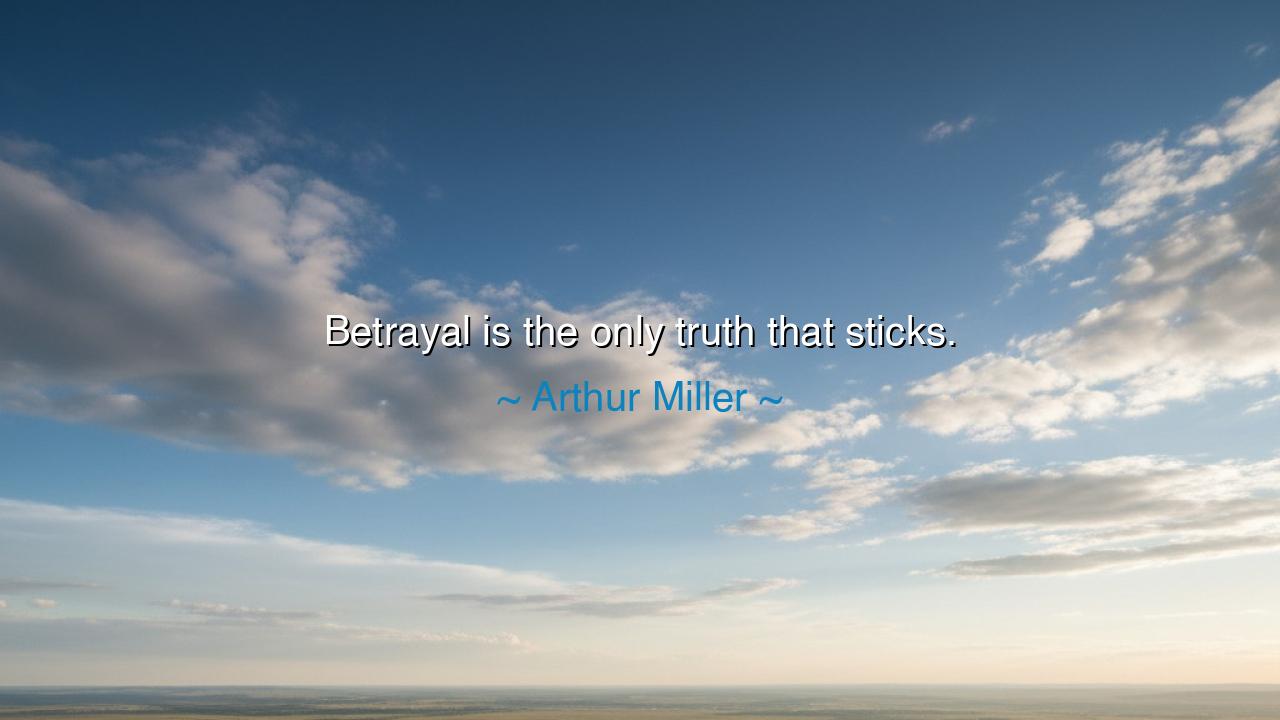
Betrayal is the only truth that sticks.






Hearken, children of time, to the voice of Arthur Miller, who spoke with the weight of human sorrow: “Betrayal is the only truth that sticks.” These words pierce deeper than the sword, for they touch upon the enduring wound of the human heart. Love fades, victories dim, joy is often forgotten in the long march of years—but betrayal carves its mark into the soul as if with iron on stone. This is the bitter truth, and once tasted, it lingers forever.
The origin of this saying lies in the nature of memory and trust. When men give their faith, they give their most sacred treasure. To be deceived in battle is grievous, but to be deceived by one’s brother, friend, or beloved is a wound that festers. Miller, who bore witness to the turmoil of his age, knew that while triumphs and promises may vanish with time, betrayal endures because it shatters the very foundation upon which all human bonds are built. It becomes the unyielding truth that sticks, for it cannot be undone.
Think of Julius Caesar, great among men, who stood at the summit of Rome’s glory. His foes he could forgive, for the clash of enemies is a natural thing. But when his friend Brutus raised the dagger, it was no longer the blow of politics, but of betrayal. History remembers not only the might of Caesar, but the sting of “Et tu, Brute?” That moment of broken trust has echoed for centuries, proving that indeed, betrayal is the truth that lingers when all else fades.
Yet let us not dwell only on sorrow. The ancient teaching reminds us that the endurance of betrayal’s truth is both wound and warning. If one has been betrayed, one carries wisdom: the knowledge of the fragile threads upon which trust hangs. And if one is tempted to betray, let the thought of its permanence weigh heavy upon the soul. For joy may be fleeting, but treachery endures in the heart of the betrayed and the conscience of the betrayer alike.
Miller’s words also carry a call to vigilance. Let men and women choose carefully those in whom they place their faith. Do not scatter trust like seed on barren soil, but sow it wisely in hearts proven true. For though love and loyalty may glow with warmth, it takes but a single act of betrayal to cast a shadow that outlives the years. Guard your spirit, therefore, yet do not let bitterness consume you; to be alive is to risk, and even pain teaches the depth of our humanity.
But what then shall we do, when the sting of treachery clings like fire to the flesh? The ancients would say: turn your wound into wisdom. Do not let the scar enslave you, but let it remind you of vigilance, of discernment, of strength. Betrayal may be the truth that sticks, but you can choose whether it sticks as poison or as medicine. To forgive is not to forget; it is to release the venom and keep the lesson.
Therefore, the lesson is thus: betrayal will come, as it has to all who live long upon the earth. When it comes, do not despair, for you join the company of kings, prophets, and poets who bore the same fate. Let it awaken your clarity, temper your trust, and deepen your soul. Walk forward with eyes open, heart guarded yet not closed, and speak truth, that you may not be the cause of the wound that never fades.
Practical is the path: choose your companions with care; test their loyalty in small matters before entrusting them with great ones. When betrayed, grieve, but rise again, stronger and wiser. And above all, never betray another, for the memory of such a deed will cling to you more tightly than shadow to the body. Thus you will honor Miller’s dark wisdom, and you will pass through life with scars, yes—but with dignity unbroken, and with truth that heals rather than destroys.






IGI'm gay
I find myself questioning why betrayal is framed as the ultimate truth that sticks. Is it because of the depth of hurt it causes, or does it expose our vulnerability? Could the truth of betrayal be that it forces us to confront uncomfortable realities about ourselves and others? Is it possible that other truths—like love, forgiveness, or growth—can also leave lasting impressions, or does betrayal simply overshadow them all due to its intensity?
AAAbi Abi
What if the 'truth' in this quote isn't about factual truth, but emotional truth? Could it be that betrayal, in its rawness, reveals something deeper about human nature, about what we fear or long for? If betrayal sticks, does it mean that we are shaped by our past wounds rather than by our triumphs or joys? Does this focus on betrayal as the 'only truth' suggest a pessimistic view of human nature, or does it simply reflect the weight of painful experiences?
BLBac Long
Arthur Miller’s statement seems to suggest that betrayal leaves an indelible mark on us, far more than other truths. But why does betrayal have this lasting power? Is it because it shatters trust and alters our view of the world? Can we heal from such a truth, or does it change us permanently? How does betrayal shape our future relationships and our ability to trust, and does it define what we believe to be true?
MManh
Is betrayal really the only truth that sticks, or could it be that betrayal is just one of the harshest truths we face? What does it say about the human experience that such a painful act becomes the defining truth for many? How do we reconcile the idea of betrayal being central to truth with the notion that truth should be something pure, uplifting, and unshakable? Could it be that betrayal distorts our sense of reality rather than revealing it?